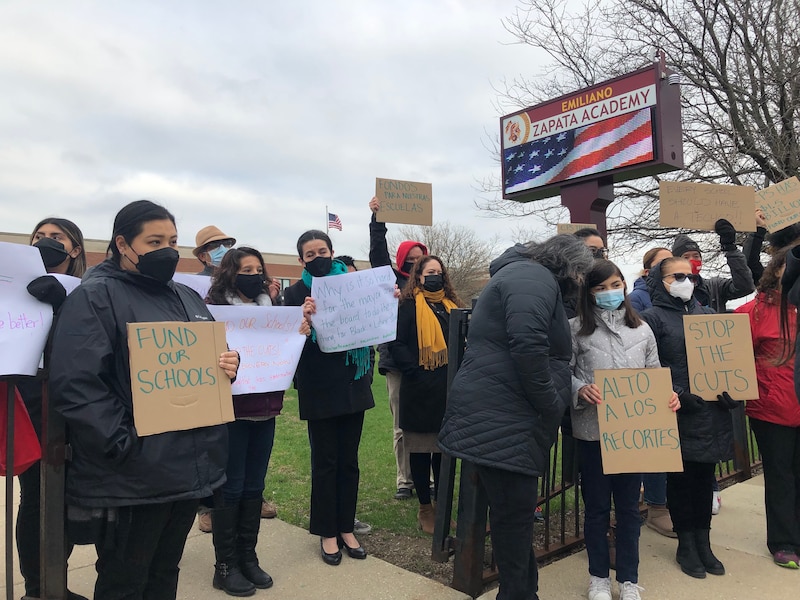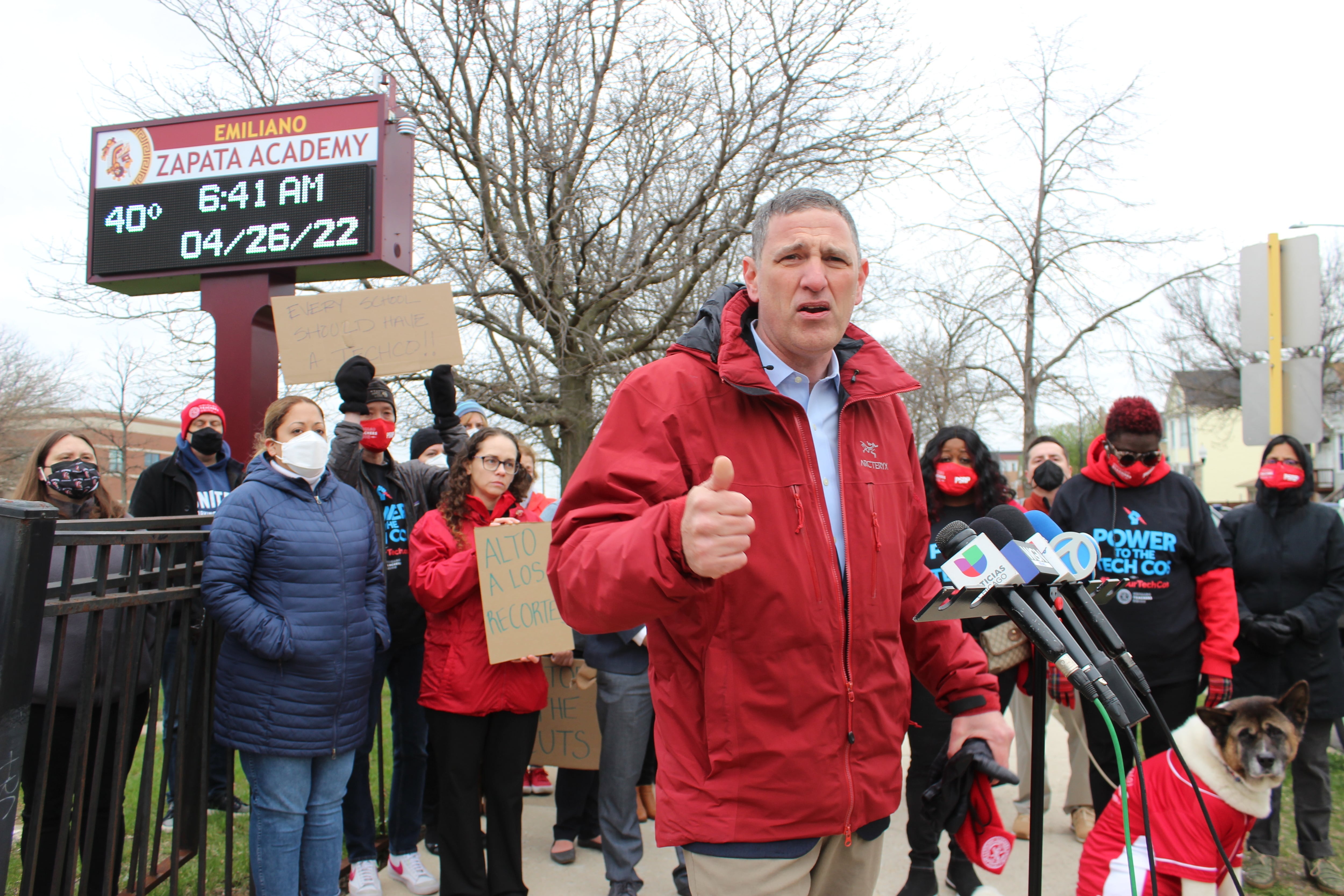Nearly 50 parents, students, teachers, community groups, and union leaders stood outside Zapata Academy Tuesday morning to condemn budget cuts proposed by the district, which the group says would harm students still reeling from the impact of the ongoing coronavirus pandemic.
More resources – not fewer – are needed to help in students’ recovery on the Southwest Side, said the speakers, who included teachers union president Jesse Sharkey, Ald. Michael Rodriguez, and State Rep. Celina Villanueva, adding to the chorus urging Chicago Public Schools to rescind its proposed cuts.
The district has said the massive cuts are driven by a drop in enrollment. CPS has experienced a net loss of about 25,000 students during the pandemic, with current enrollment at 330,400 students. An unprecedented number of students — more than 53,000 — left for other districts, private schools, and homeschooling.
Juan Sanchez, a local school council teacher representative and Zapata parent, said the high quality education offered at the elementary school was “under threat” by the district’s proposed budget.

Zapata Academy, which has seen a 10% drop in students from fall 2020 to fall 2021, was slated to lose more than $894,000, or about 13% of its budget, next fall — a cut that could claim eight teaching positions and a preschool classroom. The district has since said it will reverse a portion of this cut.
The cuts would “negatively impact students, our families, and community” by increasing class sizes and reducing resources for “our most struggling students.”
“CPS has chosen —it’s a choice— to undercut, underfund and undermine schools like Zapata’s ability to adequately educate our children,” Sanchez added.
Last month, the district unveiled the proposed 2022-23 budget, which would cut budgets at 40% of CPS schools amid enrollment declines.
Since the budget was unveiled in March, groups including the Brighton Park Neighborhood Council and Raise Your Hand have criticized the district’s decision to cut school budgets when it has received $2.8 billion in federal COVID-19 relief funds. Last month, Chicago Board members expressed concern that the district wasn’t using these federal funds fast enough to meet the needs of students now.
The district’s principals association has also been a vocal critic, urging board members to talk to principals and refrain from supporting the district’s final budget without more dollars for schools. Two more press conferences and rallies are scheduled ahead of the Board of Education’s monthly meeting.
Asked about the concerns raised, the district said it was committed to providing “a high-quality, equitable and inclusive education for all Pre-K-12 students.”
“CPS has spent millions of federal COVID-19 relief dollars on everything from additional teachers and staff to air filtration systems for every classroom and will continue to thoughtfully invest in the education of our students, including more than $290 million of new investments, funded centrally and at the school-level, in the 2022-23 school year,” CPS spokeswoman Mary Fergus said in an email statement.
The school-level budget adjustments are “only in relation to enrollment declines,” Fergus said.
Class sizes at the school were expected to remain in the 20s, while providing resources for arts instruction and intervention teachers, Fergus said.
Additional resources for professional development and summer programming would be funded through the central office, according to the district.
Outside a mayoral event at a North Side restaurant last week, about 50 parents and organizers denounced budget cuts and called for Mayor Lori Lightfoot and Chicago Public Schools to use more of its COVID relief funds to aid neighborhood schools hardest hit by COVID-19.
The budget cuts would be hardest felt on the South and West Side schools, said Jitu Brown, parent and national director of Journey 4 Justice.
“Those budget cuts are not equitable across the city of Chicago,” Brown said. “But with $2.8 billion in the coffers, the choice is to continue to slash the budgets in schools that are already suffering from deep systematic racial inequities.”
Black and brown schools are being “starved” and “sabotaged” of essential resources, he said.
The school-based budgeting approach to funding schools will ultimately result in declining enrollment and the closing of more schools, Brown added.
“Stop talking about racial justice if you don’t mean it,” Brown said, calling on the mayor to make schools “whole” with federal relief funds.
“Why is underfunding our schools negotiable?” Brown asked. “Why is that even on the table?”
Little Village, North Lawndale, and Avondale schools are among the neighborhoods facing steep cuts, according to a Chalkbeat analysis.
Pilsen parent Glenda Campoverde, who has been on the Benito Juarez local school council, said city leaders and the district officials need to invest in “our youth” and “not take money away” from Black and Latino schools.
Parent Rousemary Vega called the proposed budget a “sneak attack against parents, students and teachers.” The $60 million budget cuts will harm neighborhood schools and eventually lead to school closures especially in Black and Latino schools, the Raise Your Hand parent organizer said.
“We cannot take another cut,” Vega said. “Invest in our children now.”
Outside Zapata elementary school Tuesday, Jaquelina Salgado, a fourth grade bilingual education teacher, called the budget cuts a “distressing situation” that could eliminate at least eight teachers in the coming school year and increase class sizes.
“There is no good reason why my future students should be crammed into a classroom where I will have great difficulty meeting their academic, their social, their emotional needs,” Salgado said. “They deserve so much more.”
Ald. Michael Rodriguez, who represents a majority of the Little Village community, called on the district to restore funds to the schools, especially as they are trying to provide support to students in a community that has been among the city’s hardest hit by COVID..
“The school and community is faced with massive budget cuts that puts our children’s future at risk,” Rodriguez said. “Yes, we have enrollment decreases, driven by population loss but we also have equity needs.”
The community needed “equitable distribution of resources and investments in our kids, not cuts” to their education, he added.
Jesse Sharkey, president of the teachers union, said the union committed to fighting the cuts and restoring neighborhood schools’ budgets.
“This is a fight which we are not going to turn our backs on,” Sharkey said. “We have utmost determination that we will defend this school and other schools like it. We will not accept budget cuts to our schools in a pandemic when the money is there specifically to help our schools during a pandemic.”
Marta Lopez, a Zapata school counselor, said the cuts and elimination of paraprofessionals would also undermine the special education support.
“These cuts make It so much difficult to support the kids and their needs,” Lopez said. “The community already suffered the stress of the impact of COVID and making these cuts adds more stress to students, families, and teachers because we have to deal with supporting more kids with less people.”
During morning dropoff at Zapata, parent Enedina Anguiano said she learned about the proposed cuts a week ago and worried how the cuts to school staff would change the services the school provides to her three students, two of whom receive special education and extra support.
With less staff, Anguiano doesn’t think her daughter and son would have as much one-on-one time with teachers and paraprofessionals who have been so helpful for her children.
“I don’t think it’s fair, she said. “There’s a lot of kids depending on those extra teachers that help kids learn.”
Mauricio Peña is a reporter for Chalkbeat Chicago, covering K-12 schools. Contact Mauricio at mpena@chalkbeat.org.





